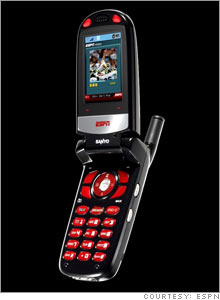 |
| The new Mobile ESPN cell phone, which goes on sale on the Web Friday and in stores on Super Bowl Sunday. |
|
|
|
|
|
NEW YORK (CNNMoney.com) -
The next great frontier for the business of sports is probably in your pocket right now: your cell phone.
Cell phone providers and broadcasters want to get sports fans who are already hooked watching sports on television to start watching while on the go.
ESPN on Friday started selling its own branded cell phone on its Web site. The Mobile ESPN phone is programmed to make it easy to watch video highlights and get scores, as well as updates and alerts about games in progress. The phones go on sale in stores nationwide on Feb. 5 – Super Bowl Sunday.
The top-of-the-line phone will cost $399, plus about $65 a month for a basic package of cell service and virtually unlimited wireless Web access -- including ESPN sports video clips.
But even if you don't have the ESPN phone, you can visit its mobile Web site for scores and articles, as well as watch its sports highlights on the millions of cell phones already capable of getting video.
More 4 million unique visitors are already accessing ESPN's Web site by mobile device each month, or about four times the average audience that tunes into the network's late-night SportsCenter show.
"We're producing two to three hours of video every day for that service," said Manish Jha, the senior vice president and general manager of Mobile ESPN.
"Most are two to three minutes (segments). That's driven in large part by what we understand of the consumption pattern of mobile devices. You don't kick back, get a beer and watch a game on a cell phone.
"But on a Saturday afternoon, you end up taking your kid to a birthday party, you want to know what the score is, watch a few plays, with mobile you have ability to stay connected."
ESPN isn't the only network with broadcasts aimed at cell phones rather than traditional television. CNN is another leader in the effort.
Experts say that sports will probably be one of the major drivers for people signing up for wireless broadcasts.
And just as ESPN captures the largest per-subscriber fee from cable operators because of the viewer demand for its programming, it's likely to be capturing more than its share of the revenue for those who will be watching video on their cell phones or other wireless devices.
"If history is any guide, there seems to be an insatiable appetite for sports content in an immediate format," said Neal Pilson, a sports broadcasting consultant. "While people may not watch an entire event, people will know they can catch the end of the game just after 11 o'clock, or the start on Monday Night Football on their way home from work."
In fact, one of the things ESPN sewed up when it won the rights to broadcast Monday Night Football starting next season was the wireless rights to the Monday night games.
It walked away from showing National Hockey League games on television this year, but it won the wireless rights there as well. And it's won the rights to Major League Baseball highlights and is reportedly in negotiations with the National Basketball Association.
But it doesn't have all the mobile rights it would like. It lacks Super Bowl wireless rights, for example, even though this year's game will be broadcast on sister company ABC, which like ESPN is owned by Walt Disney Co. (Research)
Pilson said mobile rights are not yet going for big bucks compared to broadcast rights, but they aren't being ignored anymore either -- there are few sports television deals being negotiated today that don't include wireless rights.
"I'm not sure I'd attach the label "major," (to the size of wireless rights deals) but it's going to be important and it's going to grow in importance," said Pilson.
And who is going to ultimately be paying for all this? Sports fans addicted to the need to follow their favorite sport as it happens.
Tech research firm The Yankee Group forecasts that sales of information and entertainment services on mobile phone will grow from about $1.3 billion this year, with most of that being music and ring tones, to about $4.9 billion in 2009, with about half of that being video broadcasts. And sports are likely to be a big chunk of the video broadcasts.
"If you look at what resonates, what kind of video do you want live instead of waiting to get home, it's really about sports and news," said Linda Barrabee, senior analyst at Yankee Group.
Of course the cell phone viewers won't be paying the full freight themselves. Advertisers are already angling to get into your pocket as well.
Trade publication Sports Business Journal reports that Mobile ESPN already has signed six charter sponsors for its service at $350,000 each, or about $2 million, which is pretty pricey when you realize that the service is only expected to reach 200,000 to 300,000 subscribers in the first year.
Mobile ESPN's Jha wouldn't confirm the report, but added, "It didn't look too crazy to me."
The whole idea of sports on your cell phone probably seems crazy to some people. But being a sports fan is inherently crazy to begin with.
There are potentially billions of reasons out there for ESPN to be making the bet that the next big thing in its business is going to be very small -- about the size of your two-inch cell phone screen.
For more about Monday Night Football's move to ESPN, click here.
For more on the business of sports, click here.

|